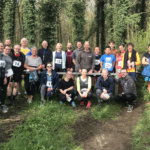A couple of years ago I had the misfortune of being diagnosed with a torn meniscus after noticing some swelling on the knee after a run. At the time I was in no pain, just annoyed at the unsightly swelling around the knee joint. So, even though I was in no pain, I thought it would be best to go and get it checked out by a physio who, to their immense credit, immediately confirmed the tear. He said that, being that I’m not in any pain, I should manage it with ice to reduce the swelling, but without an operation thats the best I could hope for.
As with most people, when I have an injury, I immediately look it up to see what I should be doing and everything I read about it said that I should have an operation to prevent the injury progressing into something worse. So, I kicked off the process by contacting my GP.
I always hate going through health care establishments due to the lack of understanding of the athletes mentality. Unless you have a sympathetic practitioner to talk to who perhaps does some form of running (or other sport), they really do not understand the runners’ absolute need to run so they generally work on a principle of “if it hurts you doing it, then don’t do it”, which we all know that way of thinking just does not hold water as a runner. I mean, even if a runner loses a leg they will get prosthetics to enable them to continue!
My analogy is this; Imagine you’re having a problem breathing, perhaps constricted breathing/wheezing or something that’s causing you pain. A normal practicioner will simply tell you to stop breathing. Whereas a lung specialist find a way to help you keep breathing and give you tips on how improve breathing and make the best of the situation you’re in. Yes, stopping breathing is obviously not an option in the real world. But for some people, stopping running is almost like stopping breathing. In running, it’s not just the act of running which is addictive, but the whole culture and community surrounding it and it strangley seems only to be accessibile if you’re a runner (at first, anyway). I’m digressing…
My first appointment with the GP was met with the usual “fun”. I told the GP that I had been diagnosed with a meniscus tear by my physio and that I would like to be referred to have an MRI so that I could see if an operation was required. The GP asked me a few questions, then suggested that I had rheumatoid arthritis and sent me for an X-Ray to confirm it, in the meantime I should take frequent doses of ibuprofen and she prescribed me something to prevent my stomach being upset by it. Of course, I didn’t take her advice, I’m not stuffing by body with drugs when I don’t need to and I was pretty frustrated that she had totally ingored the fact that I had already been diagnosed. So, the day before my X-Ray, I went out and ran 20 miles, if anything was going to show up on the X-Ray it would be after I’d ran 20 miles! Of course, the X-Ray was clear and I’d saved myself from having to injest tonnes of ibuprofen. Naturally, nobody rung me to tell me that the X-Ray was clear and that I needed to rebook to get an MRI, so after a few phone calls to find out my results I booked in again. This time around, I’d heard that a certain GP in my surgery had done an Ironman so I made sure I booked in with him and, funnily enough, my request for an MRI went straight through with no resistance.
The MRI confirmed a horizontal tear of the medial meniscus, which is probably the best outcome for an injury of this type (or so I hear). The surgeon reviewing the MRI, who had just run a marathon (Mr Pacheco), didn’t seem too concerned about it and told me that if I wasn’t in any pain that surgery probably wouldn’t be required. 6 Months later I had a follow up, with a different person this time. Instead of finding out about me, he asked me what I did for a living and, upon hearing that I had a desk job, pretty much told me that he wouldn’t even entertain the idea of an operation and immediately discharged me even after I had told him that the swelling wasn’t going away.
If you don’t know me, I best tell you now that I like to run. A lot. Distance is my thing and I just love the long run. By this point I was running 4 days a week and accumulating in the region of 40-60 miles a week with the long run on a Sunday being over 20 miles. Throw a couple of ultramarathons in there and I generally finish the year with around 2.5k miles in the bank.
Anyway, fast forward 9 months. I’m starting to get pain in the knee, I continue running but the pain is niggling at my subconcious and I decide to get booked in again. Thankfully, it was Mr Pacheco who saw me and I knew he was a bit more sympathetic to athletes (I’d heard he’d been a member of LincsQuad & Off the Couch Fitness). He booked me in to trim the meniscus and when the date came through, it was scheduled for 3 months later.
After the operation, whilst I was still spannered from the anesthetic, Mr Pacheco came to talk to me about how the operation went. He told me he had found “a lot” of arthritus in there, but he had tidied it up & trimmed the meniscus and he was hopeful that would be all he had to do. Let me tell you, it was pretty gutting to hear those words. I tried to put a positive spin on it in my mind but still, I couldn’t shake it. I went home to recover with the hope that the follow up meeting might help me make some sense of what this meant for me and my running.
Unfortunately, the follow up meeting wasn’t with Mr Pacheco, but another GP who (yet again) didn’t understand the athlete mentality. I asked him many questions which did not yield any satifactory answers. He told me that I could still run but, for example, he didn’t tell me the approximate recovery time before I could run again, despite my asking countless times. In the end, I had to spoon feed it into his mouth; “so, 6-8 weeks before I should run again then?” I said to which he nodded his head and smiled. Frustratingly, I’d heard that anything done to cartliage is at least 3 months recovery. At this point, I decided I was going to pay and see someone could tell me something more helpful.
However, one thing he did say to me that shook me to my core. I should stop doing any long distance running. If I continue, I will need a knee replacement by the time I’m 50.
Apparently, there is some damage to the articular cartliage which will degrade further the more I run. Given the lack of help/advice I was given during the follow up meeting, I have decided to a few things to give myself a fighting chance when I get back to running:
- Seek Advice – Book into a private sports physiotherapist who can give me an objective assessment of my situation. Someone who understands my predicament and will not immediately write off my running
- Options – What are my options? I’ve heard talk about transplants and stem cell therapy to replace the cartliage. For my long term running, look into what is possible to stop the degradation
- Accept – Acceptance of the situation that I’m in can allow me to adapt my training rather than just tring to push through it. I have to work with my body not against it
- Strength Work – Check for imbalances and correct. Stronger support around the knee joint will slow the degredation. It could be that I’ve been running with an imbalance that I haven’t found which has caused the situation in the first place
- Other Sports – Whilst I was waiting for the operation, I started swimming. In recovery, I have added cycling to help build fitness back up. From now on, it looks like these sports might have to have a more prominent feature in my endurance training. I might not like them as much as running, but if I can offload the knee and keep my fitness good, I might be able to sneak in the odd ultra 🤞
It’s not over until it’s over as they say. I did have a few events in mind for this year once I had got recovery out of the way but I noew have to reassess. But, until I have spoken to a professional sports practicioner I’m not counting myself out just yet.


